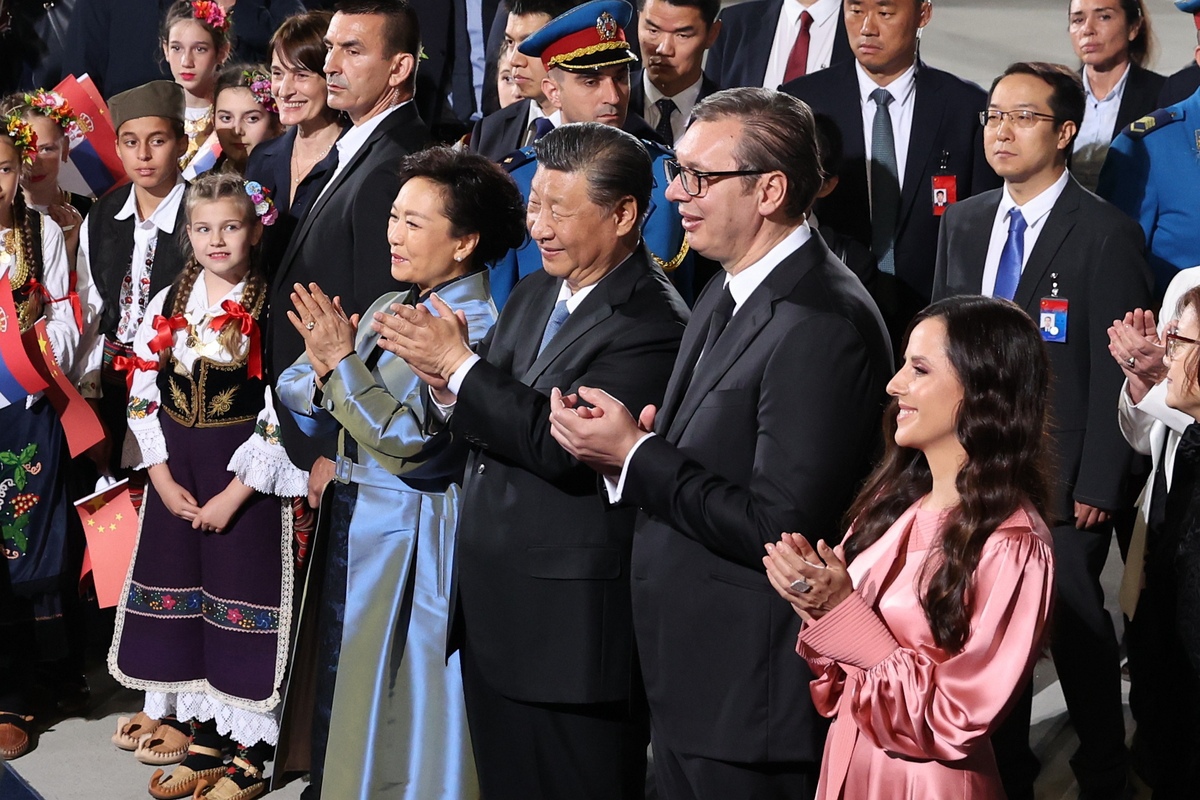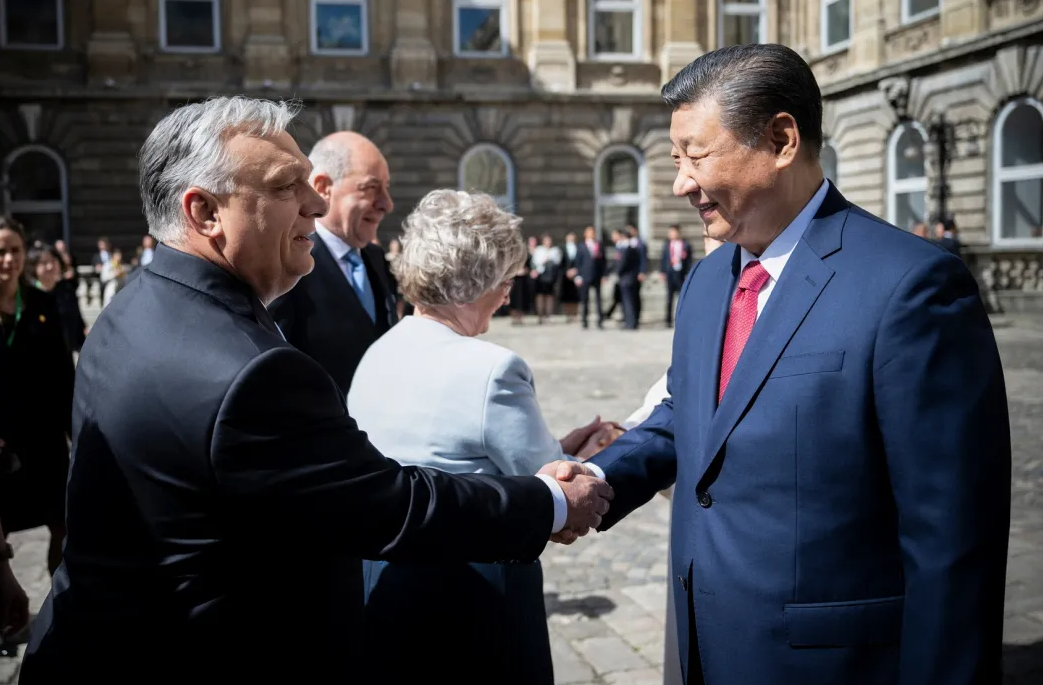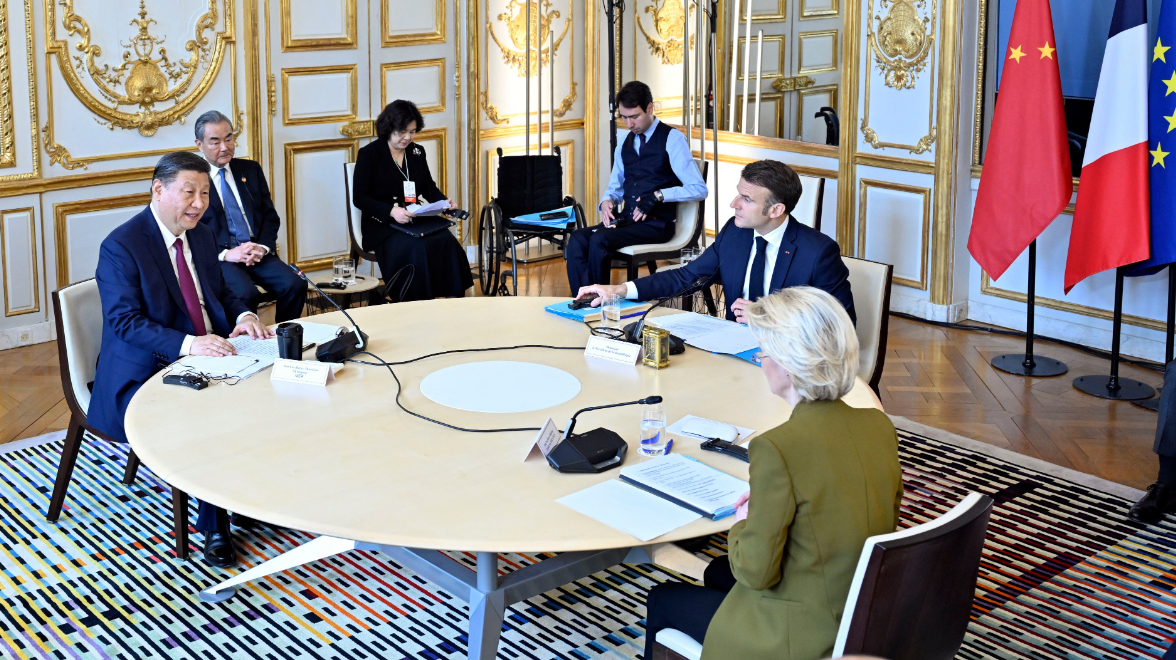
Chinese President Xi Jinping and his wife, Peng Liyuan, are welcomed on May 7, 2024 by Serbian President Aleksandar Vucic (front, second from right) and his wife, Tamara Vucic (front, right), upon their arrival at Nikola Tesla Airport in Belgrade, capital of Serbia. (Photo: WANG Zhuangfei / CHINA DAILY)
President Xi Jinping recently concluded his five-day visit to three different countries in Europe: France, Serbia, and Hungary. Much of the subsequent commentary has sought to focus on the long-standing ties between Serbia and Hungary, and China and Russia, as well as the different attitudes with which Beijing views Paris in relation to Belgrade and Budapest.
More sceptical voices appear convinced that China is seeking to leverage the divides and disagreements within the European Union, to further cement its selective relations with select Eastern and Central European states. More affirmative voices alluded to the Sino-Hungarian relationship – one that has now been elevated to “all-weather comprehensive strategic partnership” – as an exemplar of how diplomatic engagement with China can be conducted to the advantage of European economies.
Yet what remains palpably missing in such frames and narratives is a perspective that I see central, albeit surprisingly neglected: the perspective of European interests. Indeed, for Beijing to understand what the European Union is – and isn’t – is pivotal to an enduring Sino-European partnership and fostering a constructive dynamic going forward. Short of understanding and valuing the European desire for strategic autonomy, the mending of rifts and bolstering of ties between Beijing and Brussels would prove to be incredibly difficult, if not non-viable altogether.

Chinese President Xi Jinping (right) shakes hands with Hungarian Prime Minister Viktor Orban (left) prior to a welcoming ceremony in Buda Castle of Budapest, Hungary on May 9, 2024. (Photo: Vivien Cher Benko/Pool/AFP)
Making Sense of European Strategic Autonomy through European Eyes
The past few years have seen the Chinese leadership rhetorically articulate its acknowledgment of and tentative respect for European strategic autonomy. Both during French President Emmanuel Macron’s visit to China last year and in his meeting with Macron and EU President Ursula von der Leyen, President Xi has highlighted that Europe must play an independent role in a multi-polar world order – one where it shifts away from relying excessively upon the United States and engages other partners more evenly and equally.
Macron’s neo-Gaullist worldview and ambition to steer the EU’s China policy, in light of a vastly weakened and internally divided Germany, have driven him to provide a largely effusive response to Beijing’s signals. German Chancellor Olaf Scholz’s recent visit to Beijing, coupled with Germany’s ongoing economic difficulties, was further testament to China’s economic heft and significance for many European manufacturers and producers.
Indeed, unlike the more bellicose and unflinching voices in Washington DC, a vast majority of the European leadership – whether it be on the national level or in Brussels – is uninterested in pursuing an ideologically rooted, geopolitically intense containment campaign against China. Strategic autonomy appears to be a coherent vision that would allow the EU to maintain equal distance from Beijing and Washington, whilst reaping the benefits of doing business with both.

Chinese President Xi Jinping (1st L), French President Emmanuel Macron (2nd R) and European Commission President Ursula von der Leyen (R) hold a trilateral meeting at the Elysee Palace in Paris, France, May 6, 2024. (Photo: X account of Hua Chunying)
Yet there are two distinct reasons as to why the EU has struggled to reap the dividends of such dexterous hedging and balancing – as both the Gulf Cooperation Council and ASEAN have – amidst an increasingly fractious Sino-American rivalry. These two considerations also have an active bearing on how most European leaders conceptualise “strategic autonomy,” thereby leading them to be distinctly more cautious about Sino-European relations.
The first, is that autonomy must be built upon security. Many Central and Northern European states – especially former Soviet states (including the Baltic states) and Nordic states – view the Russian invasion of Ukraine as a harbinger for their own national security. The ongoing war in Ukraine is widely seen as a near-existential threat, for many fear that Russia would be eyeing other neighbouring states should it be permitted to prevail in Ukraine.
China’s complex straddle – seeking to deepen economic and energy ties with Russia on one hand, as India has, whilst concurrently putting rhetorical and compliance-based distance between itself and Russia’s military actions abroad – has been met with lukewarm scepticism, with two-thirds of Europeans firmly convinced that Russia is an adversary as of mid-2023. Short of overcoming such perceptual obstacles and winning back the hearts and minds of the European crowd, Beijing will likely find bilateral engagement with a majority of EU states increasingly difficult.
The second, is that strategic autonomy calls for what European leaders and politicians construe to be “reciprocal treatment.” A talking point that has gained growing salience is the purported charge of “over-capacity” of China’s strategic manufacturing sector. Whilst the world at large would in practice benefit from the much-cheaper electric vehicles (EVs) and renewable energy products on offer, it is clear that large European manufacturers feel systemically jeopardised by the competitiveness of their Chinese counterparts.
In the eyes of a growing number of European businesses, strategic autonomy requires a fair, even-handed preservation of their commercial and industrial interests, which have already been partially undermined by the Biden administration’s vigorously interventionist Inflation Reduction Act that came into effect last year.
Repairing Sino-European Relations Remains Possible
Given the above, the question inevitably becomes – how can Beijing put into practice these two observations?
Firstly, China must devise a coherent and renewed strategy on Ukraine. As the U.S. elections loom nearer in November and the possibility of a Donald Trump term II grows by the day, leaders across European capitals are deeply perturbed by the threat of implosion to the NATO backing for Ukraine. Both Moscow and Kyiv alike are looking for an off-ramp – with supplies running low in the latter, and significant though non-structural depletion of manpower in the former.
It is not too early – or late – for Beijing to work with Brussels in mapping out a path towards peace that acknowledges and upholds European security interests vis-à-vis Russia. Given Europe’s significance as a key export market for China, it is not in anyone’s interest for the present war in Ukraine to further escalate or spill-over into other European countries. Chinese diplomats and bureaucrats should also pay more heed – in public and in negotiations – to the sensitivities and concerns of Western and Central European states wary of Russian influence in the region.
Secondly, Chinese firms can indeed strive for “win-win” cooperation with their European counterparts through pursuing joint ventures with revenue sharing arrangements. Automobile manufacturers in Germany and Spain (making up roughly 31% and 19% of total EU vehicle production) would stand to gain from the technology and market access granted by further collaboration with Chinese counterparts, whilst Beijing could also look to assuage some of the overblown worries concerning “over-capacity”.
In the long run, China and the EU should look to establish more systematic and strategic partnership arrangements with Southeast Asian nations – with Chinese firms contributing technology and value-added manufacturing, ASEAN factories serving as the primary manufacturing base, and EU investors contributing seed capital in exchange for profits and stake in the cross-regional operations. This is but one of the many possible commercial constellations and arrangements that could arise from the triangulation of the Sino-European relationship – it need not, and should not be a zero-sum dynamic.
Repairing Sino-European rifts will take time, but is distinctly possible. Those in the European Union who are not firmly wedded to a future defined and dominated by Washington, should welcome the rise of China as a counterbalancing force and alternative partner. Those in Beijing who are in search of a new multipolar order, should also welcome a rejuvenated Europe with its security interests respected and intact. May all those who truly want a win-win partnership between China and European unions, succeed in their aspirations.
